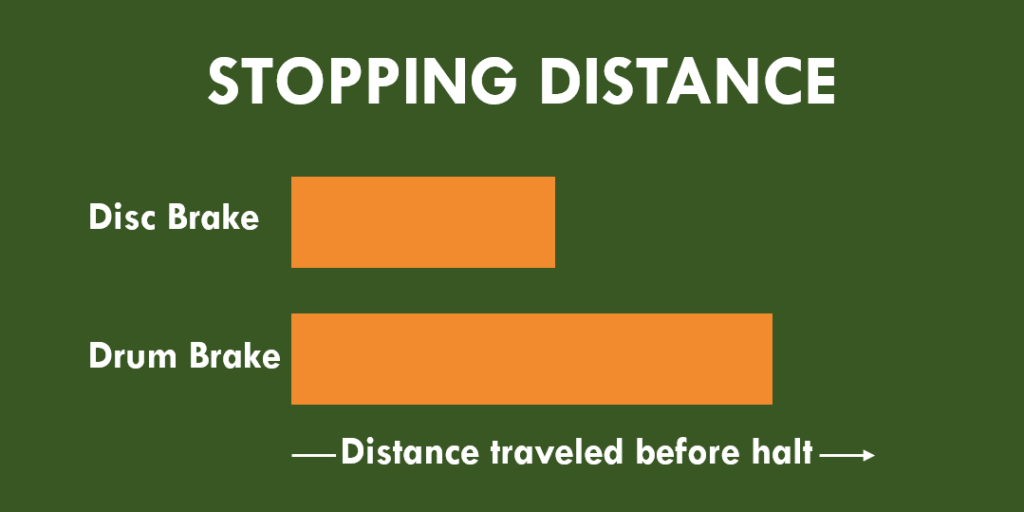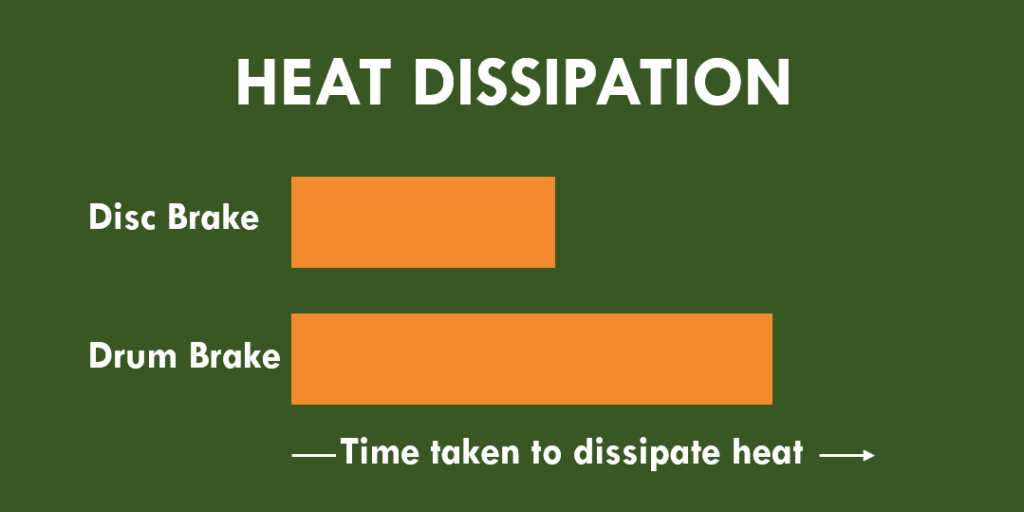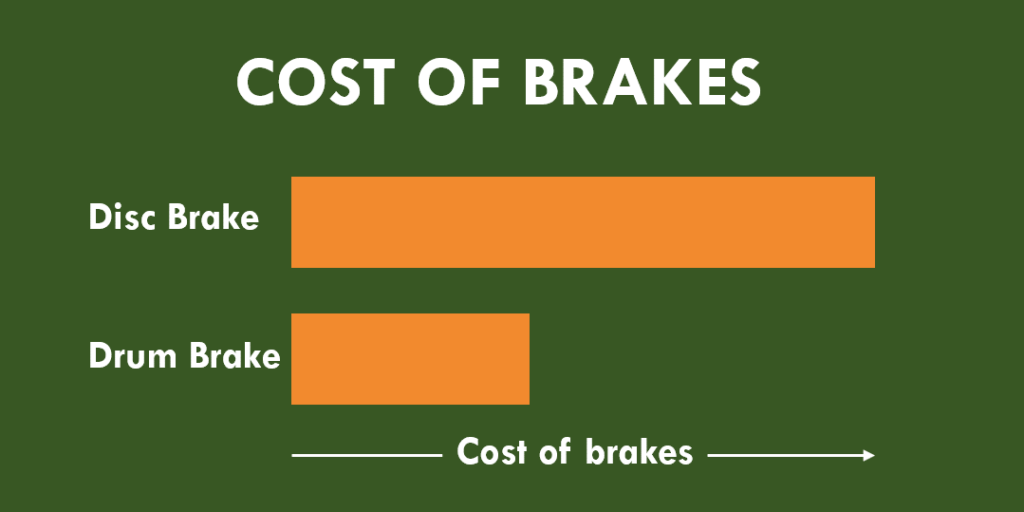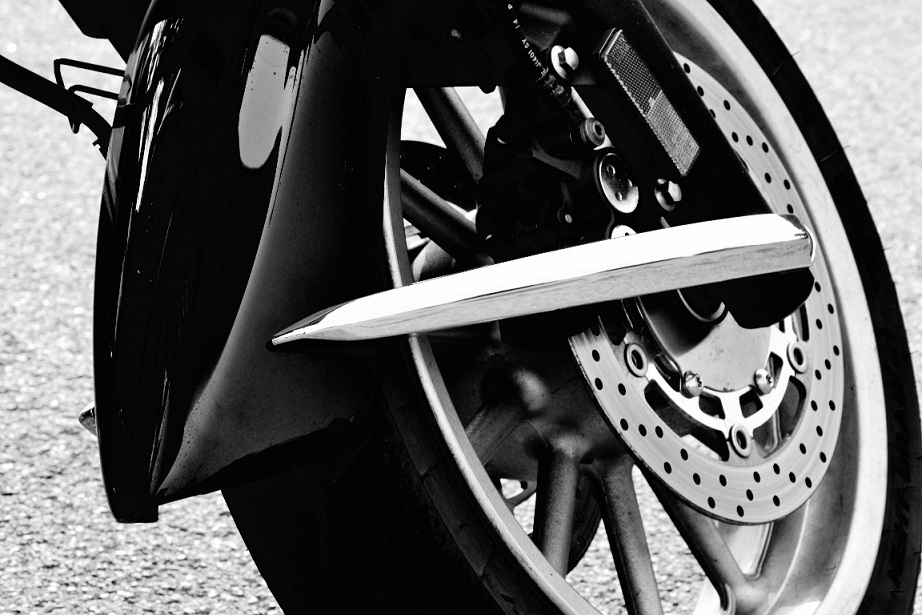The modern motorcycles have highly efficient braking systems. With the introduction of ABS (anti-lock braking system), the Disc brakes have increasingly become the preferred braking system in most motorcycles.
However, drum brakes do fare better in some of the parameters when compared to disc brakes.
As for the question – which among the Disc brake and Drum brake – is better for a motorcycle? The Disc brakes provide better braking performance specially when coupled with ABS. Disc brakes also provide better stopping power, low stopping distance, better heat dissipation and maintenance.
Drum brakes, on the other hand, does not have superior functionalities but they are low cost and don’t skid much on slippery roads.
For a more detailed comparison between these two brake systems, let’s dive right in.
How Does A Disc Brake Work?
In a disc brake, whenever you pull in the front brake lever with your right hand, the brake fluid near the lever gets pressurized.
This pressurized brake fluid connects with the brake pads in the wheel through a brake cable. The brake pads once activated through the pressurized fluid, applies the brake not on the wheels, but on the disc connected to the wheel.
Here, the disc brake uses a rotor (disc) and a caliper to halt the wheel motion. This mechanism where the brake is applied on the discs (rotor) by brake pads in caliper with the force being transmitted hydraulically – is known as disc brake mechanism.
Here is a YouTube video if you are interested in understanding the complete disc brake mechanism.
How Does A Drum Brake Work?
In Drum brakes, wheel cylinder with the aid of hydraulic pressure forces brake shoes against the drum. This drum is attached to the wheel shaft and is mounted within the wheel encased.
Whenever the brakes are applied, the piston pressurizes the brake fluid, which in turn pushes the pistons within the back plate to apply pressure on the brake pads.
As a result, the brake pads move and come in contact with the drum. The friction created due to this contact, will arrest the rotation of wheel shaft.
Here is a video explaining the Drum Brake mechanism in detail.
Performance Of Brakes Against Different Parameters
Now that we have a basic idea on how these two brakes function, let us discuss their performance against different parameters.
The parameters considered here are – stopping distance, stopping power, heat dissipation, wheel lock-up, maintenance, skidding and price.
Stopping Distance
This is possibly the most important parameter when choosing a brake type.
Whenever you apply brakes, you want the motorcycle to come to a halt as early as possible and to move as low a distance as possible.
How responsive the brake is, how efficient and how much distance wheel the bike travel before halting – all these factors determine the desirability of a brake. Lower the stopping distance better is the brake performance.
With regards to stopping distance, a disc brake is a better option than a drum brake.

Disc brakes have a lower stopping distance and brings the motorcycle to stop much earlier when compared to a drum brake.
And the introduction of ABS (anti-lock braking system) along with the disc brakes are even better alternative to enhance the stopping distance in your motorcycle.
Stopping Power
Disc brakes absolutely are far better brakes when it comes to stopping power.
Whether the motorcycles are running at a high speed or a low speed, whether it is overloaded or not, the disc brakes bring the wheel to rest far more easily than the drum brakes.
Another advantage of dis brakes is that you can increase its stopping power easily if you wish.
The stopping power can also be further improved in disc brakes by using an enlarged brake pad, or using multiple brake pads or even using dual disc rotor plates in the wheel.
However, the same cannot said about a drum brake.
Heat Dissipation
Heat dissipation play a vital role in determining the life expectancy of the brake pads.
Whenever the brakes are applied, doesn’t matter if it is a disc brake or drum brake, the brake pads come in contact with the rotor or drum and causes friction between the surfaces.
As a result, the friction between these surfaces generate heat in the braking system.
A better system allows this heat generated to dissipate faster and not stay in the system for too long. If at all the heat is trapped, the brake pads will get damaged overtime and hence, will have a shortened lifespan.

Unlike Drum brakes, Disc brakes are not enclosed. Rather they are in the open and the air can easily circulate over the surfaces. Drum brakes, on the other hand, are enclosed and are not exposed out in the open. This closed situation makes the heat not able to dissipate easily for the drum brakes.
And that’s why, the Disc brakes have a far more heat dissipating capabilities than drum brakes. The open-air circulation makes the disc brakes to lose the heat in a speedy manner.
Wheel Lock-Up
There is always a chance that your motorcycle wheel will lock up when you suddenly apply the brakes in a Disc braking system, subjected to the condition that your motorcycle does not have ABS (anti-lock braking system).
In case the wheel does lock-up, there is a risk of crashing and accident with your motorcycle.
However, there is no possibility of wheel lock-up in a drum brake system. So, if your motorcycles do not have an ABS, then drum brake fares better when it comes to the wheel lock-up. But, if there is ABS, Disc brakes work fine as well without any lock-ups.
Maintenance
You can easily clean up and take care of Disc brakes since they are out in the open.
The disc rotor can easily be replaced and cleaned. Even the brake callipers can be dismantled by yourself and clean the brake pads.
You don’t need to visit the dealer or service center. Even if you do, the cleaning and maintenance of a Disc brake is a simple task for the mechanic.
The same cannot be said about the drum brakes though. The periodic maintenance for a drum brake is relatively difficult since you need to remove the wheel itself first.
Then, you have to dismantle the drum brake casing, clean the drums, back plate, springs, and brake pads. Even for a mechanic, it is a time intensive process.
As a result, the periodic maintenance of a Disc brake is far easier than that of a Drum brake.
Skidding
This is specifically applicable during the rainy season or when you are driving on muddy roads or slippery roads.
It is not absolute that Disc brakes make you skid. However, if you are still a beginner, Disc brake makes the motorcycle more prone to skidding when compared to a drum brake.
So, if it has not been too long since you are riding a motorcycle, be aware that disc brakes can make the motorcycle skid on a slippery road. Take extra precaution by slowing down while riding in these roads.
Price
This one should be obvious. Disc brakes provide a superior braking performance as witnessed in the above parameters when compared to Drum brakes.
So, naturally, Disc brakes are costlier.

Drum brakes, with their shortcomings and their technology obsolescence, are economical and are available at a lower price than the disc brakes.
Summing Up
Here is the summed-up table of Disc Brake vs Drum Brake, for each of the performance parameters discussed above.
| Parameter | Disc Brake | Drum Brake |
|---|---|---|
| Stopping Distance | Low | High |
| Stopping Power | High | Low |
| Heat Dissipation | Easy | Difficult |
| Wheel Lock-Up | High (without ABS) | Low |
| Maintenance | Easy | Difficult |
| Skidding | High | Low |
| Price | High | Low |
Bottom-line: Which Brake Is Better?
Disc brakes provide better stopping power, low stopping distance, better heat dissipation and maintenance.
Drum brakes, on the other hand, does not have much better functionalities but they are low cost and don’t skid much on slippery roads.
In general, Disc brakes seem to be the superior braking system, especially when coupled with ABS (anti-lock braking system). Their braking performance is far better when compared to drum brakes.
We would recommend to go for disc brakes and add it with ABS any day for your motorcycle.
